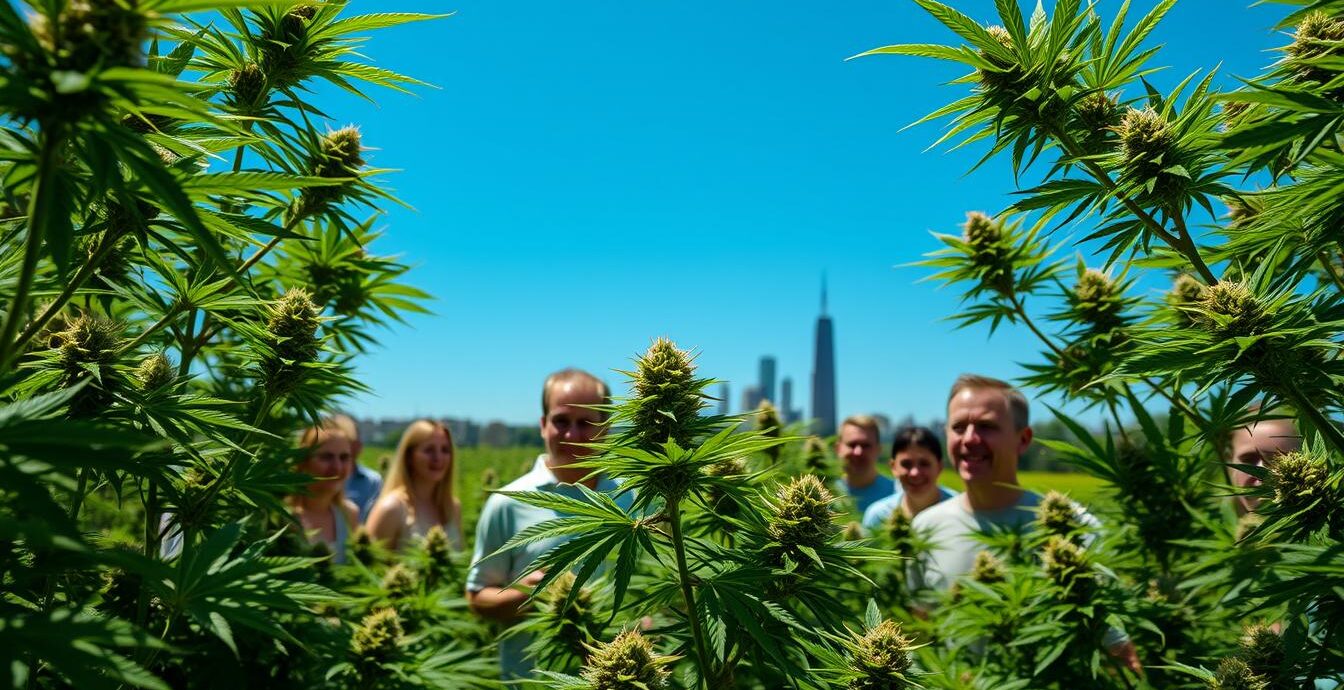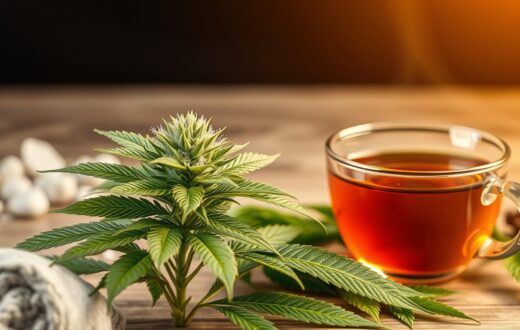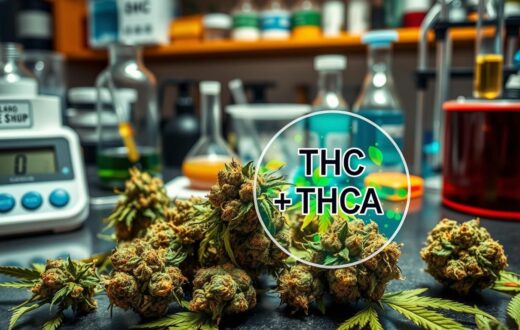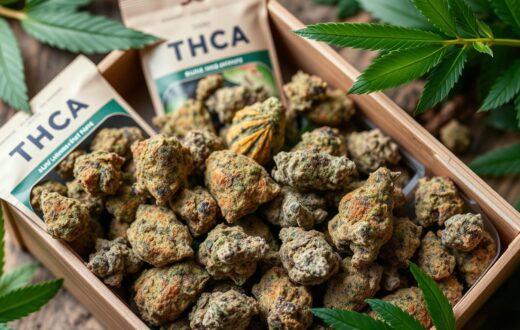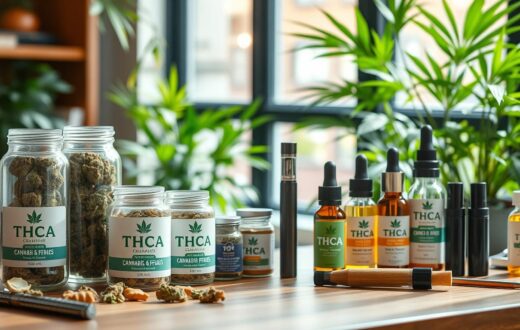Ever wondered why a cannabis compound can be legal in one state and illegal in another? The complex world of THCA legality in the USA is a perfect example of this puzzling situation.
THCA, or tetrahydrocannabinolic acid, is a key player in the cannabis industry. Its legal status varies across the United States, creating a patchwork of regulations that can be confusing for consumers and businesses alike.
The 2018 Farm Bill opened the door for hemp-derived products, including THCA. But here’s the catch: THCA is legal only if it contains less than 0.3% THC by dry weight. This federal guideline has led to a boom in the THCA market, with products like oils, flower, and edibles becoming more accessible.
State-by-state differences add another layer of complexity to THCA regulations. While it’s legal in most states, seven have specific restrictions: Arkansas, Minnesota, Oregon, Rhode Island, Idaho, New Hampshire, and South Dakota. Other states like Pennsylvania, Texas, California, and Colorado have their own unique rules.
As we dive deeper into the world of THCA legality, we’ll explore the nuances of federal and state laws. We’ll also look at the impact on consumers and businesses. And we’ll discuss what the future might hold for this fascinating compound in the ever-evolving cannabis landscape.
Understanding THCA: What You Need to Know
THCA is a key topic in discussions about hemp-derived cannabinoids legality. It’s important in the cannabis plant and interests both medical and recreational users.
What is THCA?
THCA is a non-psychoactive compound found in raw cannabis plants. It’s the precursor to THC, the well-known psychoactive component. Unlike THC, THCA doesn’t make you high when consumed raw.
The Farm Bill of 2018 changed the rules. It removed hemp from controlled substances if it has 0.3% or less THC on a dry weight basis. This affects THCA legal status.
Differences Between THCA and THC
THCA and THC have different effects. THCA doesn’t get you high, while THC does. When cannabis is heated, THCA turns into THC.
Research shows THCA might have anti-inflammatory and neuroprotective properties. A study on mice found it could lower proteins linked to Alzheimer’s and improve cognitive function.
The legal status of THCA is complex. It’s legal in most states if the cannabis has less than 0.3% THC. But, regulations vary. This has led to a rise in THCA products, especially in states like Texas and Wyoming.
However, the CDC warns about lung harm from smoked cannabis. This is true for any form of cannabis.
The Legal Framework Surrounding Cannabis in the USA
Cannabis laws in the USA are complex and often contradictory. The 2018 Farm Bill created a $28.4 billion hemp-derived cannabinoid market. It defines hemp as having no more than 0.3% delta-9 THC on a dry weight basis. Yet, federal and state laws don’t always align, creating challenges for THCA farm bill compliance.
Federal Laws Impacting Cannabis
The Controlled Substances Act classifies cannabis as a Schedule I substance. But the 2018 Farm Bill made exceptions for hemp and hemp-derived products. Recent proposals aim to redefine hemp based on total THC, including THCA. This could impact THCA drug enforcement policies nationwide.
State-by-State Differences
State laws vary widely. Some allow medical and recreational use, while others maintain strict bans. For example, California’s AB 2223 seeks to prohibit synthetically derived cannabinoids. Nebraska’s LB 999 clarifies the illegality of CBD products with THC above legal limits. These differences create a patchwork of regulations, making it difficult for consumers and businesses to navigate the legal landscape of cannabis and its derivatives, including THCA.
The 2018 Farm Bill and Its Implications for THCA
The 2018 Farm Bill changed the cannabis world a lot. It made hemp legal and took it out of the Controlled Substances Act. This opened doors for hemp products, including those with THCA.
What Does the Farm Bill Say?
The bill says hemp is cannabis with less than 0.3% THC. It lets states control hemp but can’t stop hemp products from moving across state lines. This led to different rules in each state.
How the Bill Affects THCA
The bill’s impact on THCA is tricky. It made hemp-derived cannabinoids legal, but the DEA says THCA isn’t legal hemp. This is because THCA can become THC. The rules on THCA vary by state, with some allowing it and others not.
The Farm Bill’s effect on THCA has caused a lot of debate. It has led to more research and new products. But, it also brings challenges for those making and selling THCA products. They face changing laws and unclear rules. The future of THCA’s legal status is still up in the air as laws are interpreted.
States Where THCA is Legal
THCA laws vary across the United States. Many states have made THCA legal, either through broad cannabis reforms or specific hemp-derived product regulations.
Overview of Legal States
In California, you can buy THCA from designated shops. Texas allows THCA from hemp with 0.3% or less THC. Kentucky doesn’t have specific rules for THCA from hemp with less than 0.3% delta-9 THC.
Florida and North Carolina also allow THCA from hemp with similar THC limits. New Mexico, Georgia, Wisconsin, Alabama, and Indiana have similar policies for THCA from hemp.
Key Regulations for THCA Usage
The 2018 Farm Bill makes a big difference. It protects hemp products with less than 0.3% THC under federal law. This means THCA from hemp flower is safe under federal law.
But, each state has its own rules for THCA. It’s important for consumers to know the local laws. For example, some states will ban certain hemp-derived products starting July 1.
Lab testing and third-party verification are key for ensuring THCA product quality and legality. Healthcare professionals are looking into THCA’s benefits, like reducing inflammation and nausea. As cannabis laws change, it’s important to stay updated on state-specific THCA regulations.
States Where THCA is Restricted
In the United States, laws about tetrahydrocannabinolic acid (THCA) vary. Some states have strict rules on THCA. It’s important for both users and businesses to know the laws in these places.
States with Strict Cannabis Laws
Idaho has very strict rules on THCA. Even small amounts can lead to fines and jail time. South Dakota has banned THCA, despite efforts to legalize cannabis.
Nebraska also has tough penalties for THCA crimes. These can include fines and jail time.
Legal Challenges and Implications
States have different rules for THCA, causing legal problems. In Kansas, THCA is a controlled substance, leading to criminal charges. West Virginia allows medical cannabis but not recreational THCA, limiting access to those with certain conditions.
Interestingly, 25 states allow THCA from hemp with less than 0.3% THC. This creates a confusing mix of laws. The debate over THCA’s regulation and benefits continues.
The Role of Medical Marijuana Laws
Medical marijuana laws across the U.S. shape the landscape for THCA and other cannabis compounds. These laws recognize the potential benefits of cannabis-based treatments for various health conditions. The legal status of THCA often falls under broader medical cannabis regulations, which differ from recreational or hemp-derived product laws.
Medical Use of THCA
THCA shows promise in treating several health issues. While federal law doesn’t allow whole plant Cannabis sativa use, many states permit THC for medical reasons. Healthcare professionals can suggest medical marijuana types and dosages, but can’t prescribe it. Studies indicate medical cannabis may help with conditions like Alzheimer’s, epilepsy, and chronic pain.
Patient Rights and Regulations
Patient rights and regulations vary by state. Some require physician recommendations, patient registries, and designated dispensaries. The FDA hasn’t approved cannabis as a treatment but has green-lit specific cannabinoids for certain conditions. Consumption methods include inhalation, ingestion, and topical application, each with different onset times. Hemp-derived cannabinoids legality remains a complex issue, with THCA farm bill compliance playing a crucial role in determining product legality.
As of now, 24 states and D.C. have legalized marijuana for medicinal or recreational use. The DEA is considering reclassifying marijuana from Schedule I to Schedule III, which could impact its medical use and research potential. This evolving landscape continues to shape patient access and rights regarding THCA and other cannabis-derived compounds.
Potential Shortcomings in THCA Legislation
The laws around THCA are complex and often confusing. Current policies on THCA drug enforcement are unclear, causing problems for both users and businesses. The 2018 Farm Bill tried to make hemp legal, but it has caused unexpected issues.
Gaps in Current Laws
The rules on THCA are still unclear. The DEA says only delta-9 THC matters after it’s converted, but this is tricky. Fresh cannabis buds have lots of THCA, which turns into THC when heated.
Risks for Consumers and Businesses
In November 2023, The Bee Hippy Hemp Dispensary in Texas was raided for selling THCA hemp flower. Similar issues happened in Pennsylvania with delta-8 THC products. These cases show the confusion in the industry because of unclear hemp rules.
The hemp market is growing, but many growers might not follow the rules. This uncertainty puts businesses at risk of legal trouble and leaves consumers unsure about what’s legal. As talks go on about changing the Farm Bill’s rules on cannabinoids, the industry waits anxiously.
The Influence of THC on THCA Legality
The legal rules for THCA are tricky, with THC rules playing a key part. THCA’s rules are linked to THC laws because of their chemical bond. Knowing about tetrahydrocannabinolic acid rules is important for both users and makers.
How THC Classification Affects THCA
THCA’s legal status is tied to THC laws. The Controlled Substances Act lists THCA as a Schedule I substance. But, there’s a twist. Hemp-derived THCA with less than 0.3% THC is not controlled. This small detail shapes the current THCA market.
Interactions Between THC and THCA
THC and THCA’s relationship is more than just legal. THCA turns into THC when heated, a process called decarboxylation. This makes tetrahydrocannabinolic acid rules tricky. Lawmakers often look at the total THC content, including THCA, when making laws.
States have different rules for THCA. Some, like California and Texas, allow THCA products within federal rules. Others, like Idaho, ban them. This mix of laws makes the THCA market hard to navigate for businesses and users.
The Rise of CBD and Its Impact on THCA
The CBD market has grown a lot since the 2018 Farm Bill made hemp legal. This change led to a $28 billion hemp industry in the US. It also made people more interested in other cannabinoids like THCA.
CBD Market and Consumer Preferences
The CBD market’s growth has made people more aware of hemp-derived products. This change has also affected the rules for cannabinoids like THCA. The laws on these products are still complex, with some states banning them and others allowing them.
How CBD Legalization Affects THCA Status
While CBD is legal, THCA’s status is still unclear. The question “Is THCA legal in the USA?” is hard to answer. The unclear laws on THCA have caused problems in the market.
Some states are now stricter on hemp-derived cannabinoid products. This is because of the confusion over THCA’s legal status. The industry is trying to find a balance between safety, fairness, and business needs in this changing market.
Research and Studies on THCA
The cannabis plant has over 100 cannabinoids, including THCA. This compound is getting attention for its health benefits and legal status. As research on THCA grows, new findings could change cannabis laws in the U.S.
Latest Findings on THCA Benefits
THCA is found in raw cannabis and doesn’t make you high. Studies show it might help with inflammation, protect the brain, and stop nausea. These benefits are important because many people suffer from chronic inflammation and dementia is a big killer among the elderly.
Research suggests THCA could help with nausea, especially for those getting chemotherapy. It might also protect cells from damage. These findings could change how THCA is viewed legally and impact U.S. cannabis laws.
Legal Implications of Cannabis Research
The legal status of THCA is complex. Hemp is defined as having 0.3% or less delta-9 THC, but the DEA wants to include THCA in this. If they succeed, it could hurt the hemp industry a lot. As research continues, it might lead to changes in how THCA is classified, affecting its availability and use.
The Future of THCA Legislation in the USA
The laws about THCA in the United States are changing fast. More states are moving towards legalizing cannabis, which is good news for THCA. The 2018 Farm Bill was a big step, but there’s still confusion about what it means.
Predicting Changes in Legal Status
People are talking a lot about THCA and the Farm Bill. The DEA says THCA is okay as long as it’s under 0.3% THC. But, some states disagree and have faced legal battles.
The Ninth Circuit Court’s decision could change things. It might make THCA laws clearer across the country.
Advocacy Groups and Their Role
Advocacy groups are very important for THCA laws. They teach people about the laws and push for better rules. They want products to be tested and labeled correctly.
These groups help make laws more consistent. Their work could lead to fairer rules in all states.
The future of THCA laws will depend on research and public opinion. As the cannabis industry grows, money will play a role in making laws. Some states, like California and Colorado, already allow THCA flower. But others still ban it. This shows that laws will keep changing state by state.
Impact of Public Opinion on THCA Legalization
Public opinion greatly influences laws on THCA and other cannabis products. As more people learn about THCA’s benefits, attitudes are changing. This shift is pushing lawmakers to update the thca controlled substances act.
How Public Perception Influences Laws
A recent poll found 57% of Americans support legalizing marijuana for both medical and recreational use. Another 32% support medical use only. This growing acceptance has led to changes in thca cannabinoid regulation across many states.
By 2023, 38 states have legalized medical cannabis use. 24 states now allow recreational use for adults over 21.
Case Studies of Successful Legal Changes
Florida is an interesting case study. A ballot measure there would let adults possess up to 3 ounces of marijuana for personal use. Even former President Trump has expressed support for this measure.
At the federal level, there’s a push to move cannabis from Schedule I to Schedule III. This change would recognize its medical uses and ease research restrictions. These shifts show how public opinion can drive updates to the thca controlled substances act and broader cannabis laws.
How to Safely Purchase THCA Products
Buying THCA products can be tricky due to the changing laws on hemp-derived cannabinoids. The 2018 Farm Bill made THCA legal in the USA if it has less than 0.3% Delta-9 THC. This change opened new doors for consumers, but it’s important to shop wisely.
Tips for Consumers
First, check the legal status of THCA in your state. Buy from licensed dispensaries or trusted online stores. Make sure the products have clear labels showing THC levels.
Third-party lab testing is essential. It ensures the products are safe and effective. Be wary of exaggerated health claims. Remember, quality THCA comes from organic, non-GMO cannabis.
Recognizing Trusted Brands
Trusted brands in the THCA market are easy to spot. They provide detailed product info and are open about how they make their products. Look for companies that share lab reports.
Read what other customers say and check the brand’s reputation. Good brands teach you about THCA and its effects. They follow all laws on packaging and labeling. Be cautious of very cheap products, as they might not be of good quality.
By following these tips, you can safely explore the THCA market. Always put your health and wellness first when picking products. With the right research, you can find top-notch THCA products that fit your needs and follow the law.
The Importance of Lab Testing for THCA Products
Lab testing is key in the cannabis world, especially for THCA products. As rules around tetrahydrocannabinolic acid change, keeping products safe is crucial. The legal status of THCA is complex, making precise testing vital for safety and following the law.
Ensuring Product Safety
Lab tests protect people from health dangers in cannabis products. Even though rules vary by state, mold is a big problem. In Massachusetts, for example, labs started free testing for mold in cannabis.
Understanding Lab Reports
Lab reports for THCA products give important info on what’s in them. They show how much THC and THCA are present, and how pure the product is. They also check for things like pesticides and heavy metals.
But, there’s a problem with lab accuracy in the cannabis industry. Some labs might show more THCA than there really is to meet demand. This issue has led to tainted products reaching customers and honest labs losing out. As the laws around THCA keep changing, it’s more important than ever to get accurate lab reports for safety and trust in the industry.
Summary: The Current State of THCA Legality
The laws about THCA in the USA are complex. The 2018 Farm Bill changed things by making hemp and some THC legal. This change, made by President Biden until September 30, 2024, affects THCA’s legal status.
Key Takeaways
Our study of 224 THCA-related data shows a mixed legal picture. About 46.4% of entries say THCA is legal, 19.2% say it’s illegal, and 34.4% are unclear. This shows how different cannabis laws are in the US.
States like California, Colorado, and Florida allow THCA products that follow federal rules. But places like Alabama, Alaska, and Idaho still ban it.
Looking Ahead: What’s Next for THCA?
The future of THCA in the USA is both hopeful and uncertain. THCA is growing in fields like agriculture, healthcare, and cosmetics. As more states allow recreational cannabis, we might see more THCA products available.
We expect more debates and changes in THCA laws. This will be influenced by new research and changing public views. It’s important for everyone to keep up with these changes to use THCA responsibly.










